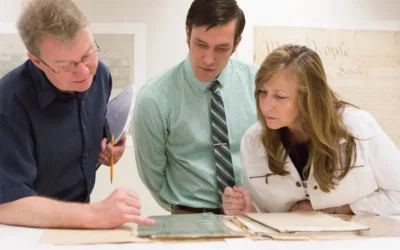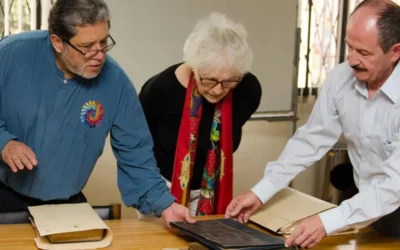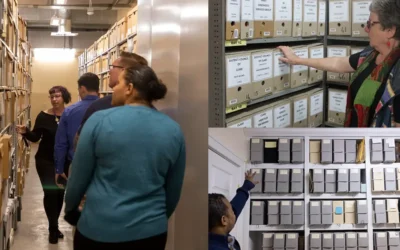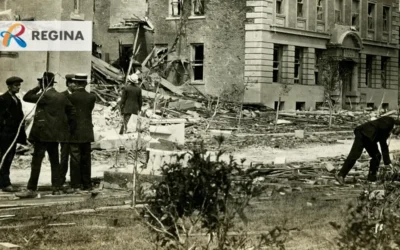How to Build a Successful Archival Project Team
Margot Note
Archival project managers can create highly functional teams that embrace change, honor individual diversity and contributions, and demonstrate good faith and goodwill. There are many aspects of team-building to consider, including the fundamentals of team size and composition.
The most advantageous size for a team depends on the archival project’s goals and tasks. The right size depends on how many people are needed to perform work required for the project, its complexity, and whether a variety of technical expertise is necessary.
If the archival project team is too small, it may not have the knowledge and skills to meet the needs of the project. The odds of conflict increase with the number of people in the team. Large teams can be unwieldy and are sometimes unable to collect everyone’s contribution. The team may find communication and cooperation difficult. The team also needs a balance of personalities. Recruit as many people as needed to get the job done.
Building Teams Throughout the Project
During the initiation phase, roles and responsibilities must be set, even if some of the team members who will fulfill those roles are unassigned. Search for team members who want to join the archival project, bearing in mind how the individuals would work together. What will be the project’s values and rules? The culture may change as project managers bring others onto the team in later phases, but it’s a good idea to spend time thinking about this now.
As the project progresses, the team rallies and the real effort of team building starts. Until now, the primary relationships will be between the archives project manager and each team member, which puts much responsibility on the project manager. Project managers know the individuals better than they know each other, so team members will come to them for help and guidance instead of going to each other. Project managers have two responsibilities: getting to know the individuals better, and helping them to get to know each other.
Team Building for Successful Archival Projects
Team building occurs as people work together on the project. Over time, team members form alliances and make friends. However, even the most extroverted people experience anxiety early in the process as they wonder how well the team will work together. Use team building activities to help alleviate this initial reticence by sharing experiences, expectations, and goals. Team members are also interested in how their teammates are doing. If one teammate seems overworked or stressed, another team member may relieve his or her workload.
When Archival Project Teams are Dispersed
Teams with dispersed members present some challenges for a project manager. Project managers also have a role in protecting the interests of the team at the home institution. Project managers with international responsibilities must educate team members on how to work well together— and also have to manage upward and ensure that executive stakeholders understand the constraints of this type of project.
Special Considerations in International Archival Projects
International projects take longer and entail higher travel costs than projects where the team is colocated, and that isn’t always a message welcomed by the senior management team. I remember once working on a project that depended on a critical, time-sensitive deliverable from an affiliate in Phnom Penh. What hadn’t been calculated was that work was scheduled during a public holiday for Cambodia, during which we wouldn’t hear back from our colleagues for weeks. Successful archival project teams find alternatives to solve problem while they wait.
I also was once a project manager for a project that required contacting art museums, historical repositories, and archives across Europe during the summer. I scrambled to schedule much of the work during June and July, with the understanding that in August, I wouldn’t hear back from anyone and should focus on other aspects of the project. Once September rolled around, everyone returned from their holidays, and the project resumed its regular schedule.
Building Team Culture
Even small organizations can work internationally by outsourcing partners overseas; that still means archival project managers face the challenges of managing multicultural teams. For international projects, team members may have different rules and expectations about behavior. For example, the importance of being on time varies from culture to culture, as do many other aspects of work. Making these expectations explicit in the beginning helps to alleviate potential conflicts. Negotiating a team culture is essential for ensuring mutual respect and understanding among team members.
While archival projects with an international element present challenges, teams based in the same country can find themselves working across different time zones. Even if project managers don’t have this problem, they could still find it challenging to manage a project team split across several locations.
Making Room for Part-time Team Members
Often, archival projects need part-time employees to help with the project. Having team members available only for specific periods can make it difficult to schedule regular team meetings and one-on-one meetings. In the worst-case scenario, part-time members may not attend meetings, because they aren’t scheduled to be working at that time. They may find that their other responsibilities limit their involvement.
Even team members who work on a project on a full-time basis could have a different functional manager. While they might be working on the project for a period, team members in this situation are likely to have responsibilities for their original team. These are moments where archival project managers will have to negotiate with their supervisor to find the best possible solution for getting work completed.
High-Performing Archival Project Teams
Project teams don’t have the luxury of a couple of months of adjustment. In a project environment, teams are expected to start reaching milestones and delivering tasks after the kick-off meeting. Sponsors think that teams will automatically gel, but experienced project managers know that this is rarely the case. With empathy and creativity, as mentioned, archival project managers can create highly functional teams that embrace change, honor individual diversity and contributions, and demonstrate good faith and goodwill.
Margot Note
Margot Note is an author, archivist, and records manager who helps individuals and organizations harness their history. See more of Margot’s posts on skill development and tactics for successful archival projects.
Similar Posts
Enhancing Collaboration; Methods for Archivists
Archivists can enhance collaboration through user-centric approaches and efficient processing methods based on customer service principles.
Navigating Selection in Archival Practice
The archival selection process is far from straightforward, given the limitations of long-term preservation and ongoing accessibility challenges.
Responsible Stewardship in Archival Practice
Responsible stewardship is a philosophy that guides the actions and decisions of archivists in safeguarding collective memory.
A Modern View of a City’s History via ArchivEra
Brief success story on City of Regina Archives’ use of ArchivEra to manage collections of legal, historical, administrative or financial significance
Hosting service
Enjoy all of the benefits of your Lucidea solution with secure, reliable, stress free hosting
Programs & incentives
No matter your size or budget, we’ve got you covered, today and tomorrow




Leave a Comment
Comments are reviewed and must adhere to our comments policy.
0 Comments